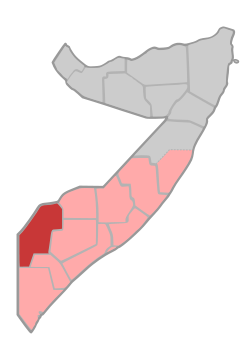Gedo
Gobolka Gedo | |
|---|---|
| Gedo Region of Somalia | |
 Location in Somalia | |
| Coordinates: 2°26′17″N 41°29′3″E / 2.43806°N 41.48417°E | |
| Country | |
| Regional State | |
| Capital | Garbaharey |
| Government | |
| • Governor | Ahmed Bulle Gared |
| Area | |
• Total | 85,000 km2 (33,000 sq mi) |
| Elevation | 914.4 m (3,000 ft) |
| Population (2019[1]) | |
• Total | 566,300 |
| • Density | 6.7/km2 (17/sq mi) |
| Time zone | UTC+3 (EAT) |
| HDI (2021) | 0.318[2] low · 9th of 18 |
Gedo (Somali: Gedo, Maay: Gethy, Arabic: جيذو, Italian: Ghedo or Ghedu) is an administrative region (gobol) in Jubaland, southern Somalia. Its regional capital is Garbahaarreey. The region was formed during 1974[3] and is bordered by the Ogaden in Ethiopia, the North Eastern Province in Kenya, and the Somali regions of Bakool, Bay, Jubbada Dhexe (Middle Juba), and Jubbada Hoose (Lower Juba) further down east. The southern parts of Gedo, west of the Jubba River, used to be part of the old British Trans-Juba region during half of the seventy years of colonial era in Africa from 1890 to 1960. The British and Italians fought twice over this area.[4]
The regional capital is Garbaharey. The Marehan (Darod) dominate economically, politically, and militarily, and rule across all districts. The Marehan in Gedo are split between the guri ('original inhabitants') and the galti ('new settlers').[5] Guri-Galti conflicts over power and resources are common, especially in Luuq, Belet Hawo, and Baardhere.
President Siad Barre's forces withdrew to Gedo following the collapse of the Somali Democratic Republic in the early 1990s.[6] After 1991, the Somali National Front (SNF) under Marehan Omar Haji Mohamed held large parts of the region for many years.[7] In collaboration with the SNF,[8] Gedo joined the growing trend of Islamic Courts at the start of the Somali Civil War and local sharia courts succeeded in making Luuq District one of Somalia's safest areas for much of the 1990s.[9] The militant religious group al-Itihaad al-Islamiya (AIAI) also rose to power in the region later, taking over the city of Luuq as its headquarters.[3] The Ethiopian National Defence Force then entered the area to attack AIAI's bases in 1996, and the Marehan clans split, either supporting or opposing the Ethiopian forces.[5] A peace conference to resolve the intra-Marehan disagreements was convened in 2004. The first democratically elected governor of the administrative region was Hussein Farey, who entered office in 2008.[10]
- ^ "Somalia: Subdivision and cities". www.citypopulation.de. Retrieved 2024-02-14.
- ^ "Sub-national HDI - Area Database - Global Data Lab". hdi.globaldatalab.org. Retrieved 2018-09-13.
- ^ a b c "Report of the Nordic fact-finding mission to the Gedo region in Somalia 15 October – 30 October 1998" (PDF). p. 7. Retrieved 31 March 2020.
- ^ "Gudoomiyaha Gobolka Gedo Xuseen Sh. Cabdi 'Farey' oo nasiib daro ku tilmaamay sida uu sharciga u garab maray Raysalwasaare Saacid |". Archived from the original on 2019-04-06. [dead link]
- ^ a b CEWERU 2013, p.19
- ^ Dool, Abdullahi (1998). Failed States: When Governance Goes Wrong!. Horn Heritage Publications. pp. 106–107. ISBN 0952524198.
- ^ Immigration and Refugee Board of Canada (1 December 1997). "Somalia: Information on the Somali National Front in Gedo and on Omar Haji Masalle including his clan and subclan".
- ^ Njoku, Raphael Chijioke (2013-02-20). The History of Somalia. Bloomsbury Publishing USA. pp. 142–143. ISBN 978-0-313-37858-4.
- ^ Elmi, Afyare Abdi (2010-08-15). Understanding the Somalia Conflagration: Identity, Islam and Peacebuilding. Pluto Press. p. 64. ISBN 978-0-7453-2974-1.
Parallel with this first court in Mogadishu, Sheikh Mohamed Haji Yusuf and Sheikh Mohamud A. Nur established a new Islamic court in the Luq district of Gedo region in 1992. This court was more successful than the one attempted in Mogadishu. These scholars succeeded in creating a secure environment in the area, and for a while, from 1992 to 1997, Luq district was the safest area in Somalia.
- ^ "Somalia: Gedo Region Elects a New Governor". allAfrica. Garowe Online. Archived from the original on 2008-10-12.
